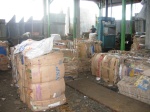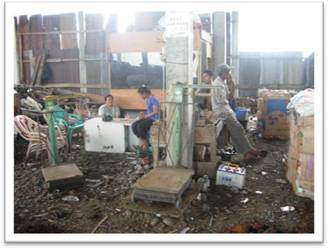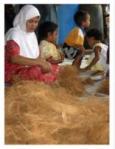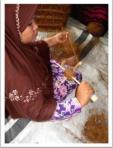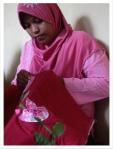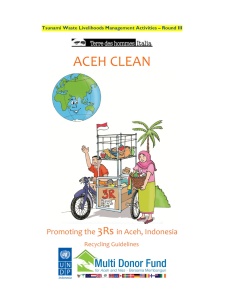|
SD 67 sits back off the main road in Banda Aceh’s west side. Stepping inside its gates, it’s quickly apparent that this is a special place.
The grounds are immaculate, lush with greenery and tempat sampah (garbage bins) at every turn. Students and teachers at this elementary school rank the environment as important as ABCs and 123s.
 “Our mission,” says grade three teacher, Ibu Nurrahmi, “is to keep our school clean and save our environment.”
“Our mission,” says grade three teacher, Ibu Nurrahmi, “is to keep our school clean and save our environment.”
Each classroom has two bins; organic and inorganic, and according to Ibu Nurrahmi, the children not only know what waste goes where, but they use them every day.
UNDP’s Tsunami Recovery Waste Management Programme (TRWMP) selected SD 67 as a recipient of its School Garbage Banks project, which trains students and teachers of the importance of waste segregation and recycling whilst cashing in on the efforts.
Recyclable material is money in the pocket of those who take the time to sell it on. TRWMP linked SD 67 with a local buyer. Since it started in late 2010 the school has earned over 500,000 IDR, which it uses to buy school supplies.
 The students are dedicated to the project and to the mission to save the environment at school and at home.
The students are dedicated to the project and to the mission to save the environment at school and at home.
“We collect the garbage to keep the school clean,” said 11-year old Cut Aura. “We also do community work on the weekends.”
It’s this dedication that impresses the Head of the Sanitation Department for Banda Aceh, Pak T. Iwan Kesuma.
“The spirit comes from the school,” Pak Iwan said. “They will keep going from kindergarten all the way to forever.”
Pak Iwan is one of Banda Aceh’s champions of cleanliness, environmental sustainability and knowledge sharing. He takes pride in the fact that this city won the prestigious Adipura Award for Environmental Excellence from the Indonesian government two years running (2009 – 2010). The Adipura committee visited SD 67 in its search for the country’s cleanest cities.
“This school is an icon,” Pak Iwan said. “It’s very beautiful here.”
 Even the school cafeteria is a point of pride. Ibu Zurha owns the canteen where hundreds of children flock to each day for lunch and snacks. Usually, school canteens are sites reminiscent of locust swarms; hungry and excited children inundate the small spaces, eat quickly and depart leaving behind a giant mess; but not at SD 67.
Even the school cafeteria is a point of pride. Ibu Zurha owns the canteen where hundreds of children flock to each day for lunch and snacks. Usually, school canteens are sites reminiscent of locust swarms; hungry and excited children inundate the small spaces, eat quickly and depart leaving behind a giant mess; but not at SD 67.
“The kids eat and then they throw out the garbage,” Ibu Zurha said. Cardboard boxes line the floor next to the tables where the kids segregate their waste according to organic or inorganic material.
After lunch, there’s little left for Ibu Zurha to do but sweep up and prepare for tomorrow.
For more programme information, please contact:
Nigel Landon, Chief Technical Advisor



